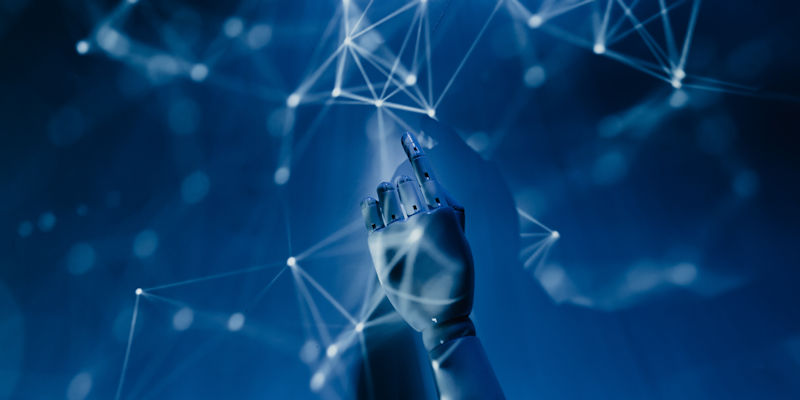
AI and Autonomous Systems in Society
Thomas Mason & Dr Philip Garnett
As a tool, artificial intelligence is already amplifying human decision making and allowing us to extend our cognitive capabilities. But where will this take us in the future?
TECHNOLOGICAL REVOLUTION
The augmented relationship developing between humans and machines in organisations has begun to have a significant impact on the culture and operations of those organisations. An online survey about ‘the state of AI in 2020’, by McKinsey, a management consulting firm, found that the largest shares of their 2,395 respondents, “report revenue increases for inventory and parts optimization, pricing and promotion, customer-service analytics, and sales and demand forecasting.” The same survey also indicated that “Twenty-two percent of respondents say more than 5 percent of their organisations’ enterprise-wide earnings before interest and taxes in 2019, was attributable to their use of AI”.
The respondents to the survey claim that AI is helping them make significantly better business decisions, which is contributing to growth. Both time and money are saved through efficiency gains from integrating technology into processes. This includes, changing from human decision making, to ‘human in the loop’ AI assisted decision making. ‘Human in the loop’ machine AI augmented decision making processes retain the influence of humans, often thought to be essential for intuition and judgement, but benefit from the information processing power of AI. An article by Deloitte in 2020 supports this statement, reporting that out of 1,900 executives in seven countries “65 percent of respondents reported their AI adoptions are providing competitive advantage”.
We are at a stage where we are adopting this technology for augmented purposes, to assist humans, but perhaps failing to fully recognise the trajectory we are on. AI and autonomous systems will displace workers - not an intended purpose we set out for when adopting it.
Related links
GROWTH OF ECONOMY & JOB LOSS
As is often the case with the rapid expansion of the use and capabilities of technology, our policies and regulations are struggling to keep up with advancements in the field of artificial intelligence and autonomous systems. In the government's national strategy for AI, they express the need to “make Britain a global AI superpower”, but there is little reference to a workable strategy, or mention of providing safety nets against disruptions like job losses in certain demographics and socio-economic backgrounds. However, PwC predicted in their report, “How will automation impact jobs?”, that “44% of workers with low education are at risk of automation by the mid-2030s”.
McKinsey in 2019 published an article ‘the future of work in black America’ also highlighting that job displacement by automation by 2030 will impact social groups unevenly in the United States of America. They “found that because of their concentration in occupations at risk of automation, African Americans have one of the highest rates of potential job displacement when compared with other groups.”
In the UK context, predictions by the Office for National Statistics UK made in 2019 indicate that perhaps as much as 7.4% of a sample of 20 million jobs in the UK could be at risk of automation. Furthermore, they predicted that “women, young people, and those who work part-time are most likely to work in roles that are at high risk of automation”. Suggesting that the effects of automation will be unevenly felt in the UK context as well.
The COVID-19 pandemic has accelerated digital transformations in business, which also led to the adoption of more remote working opportunities for society; creating a growth in economies for technology. A recent Time article, “Machines and AI Are Taking Over Jobs Lost to Coronavirus”, provides insight on how the pandemic has catalysed the replacement of humans by AI. In this article Daniel Susskind, from the University of Oxford, states “This pandemic has created a very strong incentive to automate the work of human beings. Machines don’t fall ill, they don’t need to isolate to protect peers, they don’t need to take time off work.”
The EU parliament reports that there is momentum that is being created for AI technologies due to the “rapidly increasing computing power and connectedness … AI patents have been on the rise worldwide, with a 6% average yearly growth rate between 2010 and 2015, which is higher than the annual growth rate observed for other patents.” A study in 2018 by PwC, estimates global GDP may increase up to 14% by 2030 due to rapid expansion and take-up of AI technologies; equivalent to $15.7 trillion.
In 2013, a widely cited article analysed which jobs are “susceptible to computerisation”. The authors analysed 702 occupations across the US on the basis of ‘probability of computerisation’ (ML & AI) and found that out of these 47% fell into a ‘high risk’ category. Consequently, there is a risk that jobs will be lost; impacting the economy negatively. However, even though studies indicate that while displacement and job losses occur in the short term, productivity, wealth and employment tend to rise in the long term. Certain social groups are likely to be impacted significantly more than others. We need to start ensuring that we do more to mitigate the uneven impact of technology like AI, by investing in people and developing their skills. By being prepared we can build a better resilience against negative socio-economic impacts.
UK LEGAL SERVICE SECTOR
Certain types of professional jobs may also be disrupted by increased automation and the introduction of AI. For example, the Law Society UK highlighted in a report from 2020 that the legal services sector, which contributed nearly £60bn gross value added (GVA) to the UK economy, could also be disrupted by automation and AI. The report states that “it is technology that is expected to deliver the greatest changes to the [legal] sector”, and “all of the Top 10 and 40% of Top 11-25 firms viewed technology as the key challenge facing the legal sector over the next two years.”
The Law Society report suggests that although technologies like AI will bring efficiencies to legal organisations, through the automation of some decision making processes, they also accept that there could be “knock-on effects” on the labour force.
Perhaps more significant to the UK economy is the possibility that the UK might lose its competitive edge in the legal sector as it becomes increasingly automated, and therefore easier to replicate outside of the UK. Allowing international competitors to increase their market share and/or reduce the demand for UK legal services from other countries.
CONCLUSION
The issues raised above demonstrate that there needs to be careful consideration of the adoption of these emerging technologies. Research clearly shows that certain demographics and socioeconomic backgrounds will be more heavily impacted; increasing equalities in the economy. To mitigate these potential negative impacts there needs to be better coordination between corporations and government policy-makers to ensure that we are creating a future that is safe for humanity, and artificial intelligence in businesses.
A culture of responsibility needs to be created within the artificial intelligence community. The big tech firms need to start setting the path for better governance, fair use of technology and ensuring transparent data management techniques. Once the market leaders set the path, the rest will follow. Our responsibility lies in protecting the planet, ensuring that we solve key world issues and shaping the future of these technologies.
The case of the UK legal sector also highlights potential for structural impacts to national economies. As artificial intelligence or automation could undermine nationally significant, world renowned, centres of expertise. Such as legal and financial services in the UK, by lowering the barrier to entry into those markets.
RECOMMENDATIONS
Given the weight of the evidence and how widely documented these issues are, the following policy actions at an international level are recommended for corporations and government policy makers:
1. Develop national strategies to identify job roles at risk and to redeploy displaced workers in the coming decades.
We need to develop a more holistic view on what types of work are at risk from displacement by AI and automation, looking across all sectors and whole organisations. Once we begin to understand what jobs are at risk, a strategy needs to be developed to support displaced workers.
2. Leveraging AI as a tool to ensure displaced workers are not financially punished.
Using AI to automate part of the work, means that the human could be free to focus on other things. Seeing as AI does not need to be paid, we could use the profitability to keep the workers’ wages stable - paying them partly, for the work the AI is doing.
3. Support and encourage research into AI that is beneficial to humanity.
AI is a tool that can be used to extend human cognition and has the potential to make businesses more efficient and profitable. We need to ensure that research into AI is focused on producing benefits for all humanity.
4. Improve awareness and education about AI and good ethical practices across businesses and schools.
We need to ensure that every part of society is involved with the development and integration of artificial intelligence, and ethical business practice. Targeting students at an early age will adjust them to the future of work that they will face later on in life.
5. Develop and reinforce well-informed advisory boards.
Current regulations on AI are not tailored to the field and are far behind the current advancements. Developing well-informed advisory boards will help expand the expert guidance needed to ensure that regulations are:
- Keeping up with the fast advancements of AI - by the time people who have limited knowledge have caught up with research they will be behind, due to rapid advancements.
- The regulations being made are influenced by the experts with the relevant comprehension to grasp an understanding of the artificial intelligence industry.
Featured researcher

Thomas Mason
Undergraduate Student and Laidlaw Scholar
Thomas is an Electronic Engineering Student and Laidlaw Scholar. Some of his interests include the impacts of technology on society, augmented decision making and the future of work.
Featured researcher

Dr Philip Garnett
Senior Lecturer in Systems and Organisation Associate Professor of Systems and Organisation, Ethics Pillar for the Institute for Safe Autonomy
Philip applies complex systems theory to the study of organisations. He also has an interest in how advanced technologies, such as AI, machine learning, and autonomous systems, impact how organisations work.